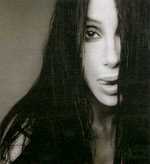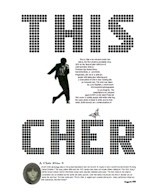 There’s a new biography of Cher in German, “Cher, Die Biografie” by Peter Lanz. Cher responded to its existence on Twitter, saying “Don't buy this unauthorized biography crew. It p*sses me off when some *sshole I don't know presumes to write about me. Idiot." She went on to say she’s “not protected in any way, because I'm a public figure".
There’s a new biography of Cher in German, “Cher, Die Biografie” by Peter Lanz. Cher responded to its existence on Twitter, saying “Don't buy this unauthorized biography crew. It p*sses me off when some *sshole I don't know presumes to write about me. Idiot." She went on to say she’s “not protected in any way, because I'm a public figure".
Biographies are a fascinating cultural artifact. They usually outsell many other categories of books. As a culture, we seem to care a great deal about trying to get to know our favorite people. This is either an obsessive pastime or some misguided intellectual quest to figure out other humans.
It is also bizarre this idea of being a “public figure.” Aside from the fact that entertainers use their “personas” as their product, I don’t see how they themselves can be defined as “public people” beyond having a public career. And to Cher's credit, it must be very discomforting to have a stranger tell your story incorrectly. Nobody can speak to how you felt.
But on the other hand, if there weren’t unauthorized biographies, there would only exist public relations spin. Although a celebrity controls the story in public relations, it isn’t necessarily always more truthful.
Cher is right that biographers don’t know her and likely get an embarrassing number of facts wrong. They may even have agendas. I always felt Lawrence J. Quirk had a conservative agenda.
But at the end of the day, even the best biographies are flawed artifacts. Every perspective is in some way prejudicial. Even one’s own. Although I enjoyed Lauren Becall’s autobiography By Myself, a book essentially made up of published diary entries, I don't doubt it's full of rationalizations, self-censures, agendas and untruths. It seems one’s own self isn’t even really qualified to write about one’s own self. And who are you anyway? Are you who you think you are, who your mother thinks you are, who most of your friends or co-workers think you are? It's hard to say.
And how would we learn anything about Thomas Jefferson, Gandhi or even Buddha, for example, if we had to rely on someone who knew them, all long dead. We should still be learning about historical icons even if their biographies are full of myths and mistakes.
Any book about Cher is doomed to this inaccuracy: a book by a stranger, a book by a friend, a mother, one of her sons, a book by Cher herself. But despite their imperfections, biographies make a good try at explaining someone’s trials and motives. Facts do tell a part of the story but certainly not all of it.
Without the messy attempts, I’d be left not knowing anything about why Frank O'Hara wrote "The Day Lady Died" or how a hard childhood in Oklahoma could make James Garner so prone to fist fights.
Which is not to say opportunists aren’t out there trying to make a buck off of celebrity fame. But who really thinks the spin Kitty Kelly doles out will affect how we view famous figures? The dis-credible biographers may make some ill-gotten earnings, but in time they tend to fall by the wayside.
The fact that Cher biographies exist at all matters. Think about how many films and books have been written about The Beatles, Bob Dylan and Bruce Springsteen. None without mistakes I'm sure. There are factual mistakes in Sonny's autobiography.
And it’s fascinating to think about what Cher might mean to Germans. Too bad this book might not tell us. I still wonder why there aren't more international biographies of Cher.
Me? I could never write a Cher biography. I’m too shy to do the interviews. But I can speak to the cultural subtexts in Cher’s persona and her works and the impact these things might have had on our culture. Does this say something about me? Yes it does. I'm rationalizing Cher. But that's we do as consumers of pop culture. We interpret everything we consume, whether we think we do or not. I may not interpret things the same way Cher would. But I am not having the same experience in life as Cher is having.
There will be crappy Cher bios. (I just read an e-book that was pretty bad). But frustration just leads to suffering. You desire the biographies to be something they can never be: well-intentioned and perfect. From a distance, they’re all part of the whole mass of good and bad. Having some at all, in some way, is a sign of importance.
But there’s nothing amiss with Cher saying, “This is a bad biography. There are a lot of errors in it.”
 Did you know Sonny’s sister self-published a biography last year? I found Bono vs. Bono, A Battle Royale by Frances Erikcson when I was searching for Cher eBooks. It's also available in paperback.
Did you know Sonny’s sister self-published a biography last year? I found Bono vs. Bono, A Battle Royale by Frances Erikcson when I was searching for Cher eBooks. It's also available in paperback.
Here is a case in point. Sonny's sister is telling the story of her battle with her father’s last wife over Sonny’s father’s small fortune. Although you are sympathetic with Frances as you read the book, you still get an unsettling feeling that she might be skewing the story her way. She often seems too much the victim in battles with her family, and in minor battles with banks and nurses. There are too many perfect betrayals, dramatic to the degree of melodrama, and yet she keeps coming back as the perfect daughter. And you know what, this may even be true. The point is, it’s difficult to believe the narrator of her own story.
That said, the book was a fascinating read, even though Cher isn’t really in it. In fact Sonny & Cher are barely in it. The worst Frances has to say about Sonny is that the siblings grew apart when he became famous, partially because her first husband was a Hollywood player-wannabie. In any case, Frances has nothing bad to say about Cher or Susie Coehlo or Mary Bono. She doesn’t really have much to say about Sonny either, except that he sided with their mother in the family saga. This is a book about the feuds between Jean Bono (Sonny's mother) and his two sisters, with the father being the pawn in much of it. Sister Liz is often mentioned as siding with Frances, but you don’t get a clear picture of her or her story.
Forget about a Cher biography. If you strung together all the dramas of Sonny’s family, Cher’s family and Gregg Allman’s family, you could have a soap opera that would run for 10 years.
 Just as I was mulling all this over this week, I came across a poem by Jane Hirshfield. It says all there is to say about biography.
Just as I was mulling all this over this week, I came across a poem by Jane Hirshfield. It says all there is to say about biography.
It Was Like This: You Were Happy
It was like this:
you were happy, then you were sad,
then happy again, then not.
It went on.
You were innocent or you were guilty.
Actions were taken, or not.
At times you spoke, at other times you were silent.
Mostly, it seems you were silent—what could you say?
Now it is almost over.
Like a lover, your life bends down and kisses your life.
It does this not in forgiveness—
between you, there is nothing to forgive—
but with the simple nod of a baker at the moment
he sees the bread is finished with transformation.
Eating, too, is a thing now only for others.
It doesn’t matter what they will make of you
or your days: they will be wrong,
they will miss the wrong woman, miss the wrong man,
all the stories they tell will be tales of their own invention.
Your story was this: you were happy, then you were sad,
you slept, you awakened.
Sometimes you ate roasted chestnuts, sometimes persimmons.


Leave a Reply